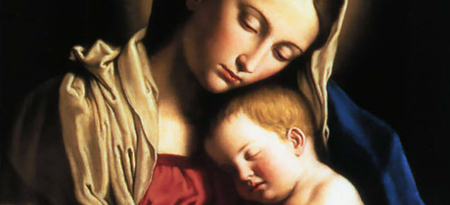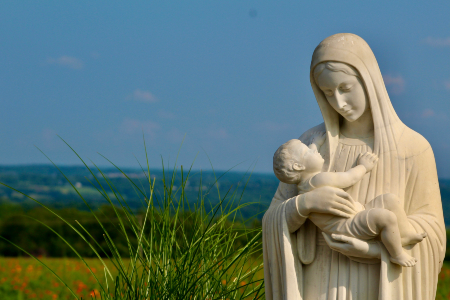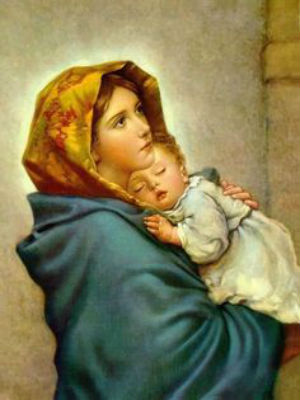We ask you, humbly: don't scroll away.
Hi readers, it seems you use Catholic Online a lot; that's great! It's a little awkward to ask, but we need your help. If you have already donated, we sincerely thank you. We're not salespeople, but we depend on donations averaging $14.76 and fewer than 1% of readers give. If you donate just $5.00, the price of your coffee, Catholic Online School could keep thriving. Thank you.Help Now >
University of St. Thomas Honors Research Goes 6 Feet Under
FREE Catholic Classes
A few hundred people have undergone cryopreservation procedures since 1962, having their bodies cooled to sub-zero temperatures, with the hope that one day they may be brought back to life using highly advanced technology. It's the kind of issue-along with assisted suicide, euthanasia and "do not resuscitate" orders-that would not have been considered decades ago but becomes a moral question today.
 Hi readers, it seems you use Catholic Online a lot; that's great! It's a little awkward to ask, but we need your help. If you have already donated, we sincerely thank you. We're not salespeople, but we depend on donations averaging $14.76 and fewer than 1% of readers give. If you donate just $5.00, the price of your coffee, Catholic Online School could keep thriving. Thank you. Help Now >
Hi readers, it seems you use Catholic Online a lot; that's great! It's a little awkward to ask, but we need your help. If you have already donated, we sincerely thank you. We're not salespeople, but we depend on donations averaging $14.76 and fewer than 1% of readers give. If you donate just $5.00, the price of your coffee, Catholic Online School could keep thriving. Thank you. Help Now >
Highlights
Catholic Online (https://www.catholic.org)
4/8/2014 (1 decade ago)
Published in College & University
Keywords: University of St. Thomas - Houston, University of St. Thomas, UST-Houston, UST, Houston, Honors Program, Honors, Graduation, Student Research, Research Symposium, Death, Mortality, 6 feet under
class="p1">Honors Program students in the Contemporary Problems Seminar are considering the issues of death and mortality as issues of hide and seek-there are paradoxical dealings with the two responses of death: to hasten it or delay it as long as possible. ---
The 13 students will present their research at the Honors Colloquium on April 11 at 4 p.m. in Jones Hall, during Research Symposium. In the final course of the Honors Program, students select a contemporary problem that interests them, choose a professor to advise them, and then collaborate on research to present to the University of St. Thomas community.
Students Explore 4 Facets of Death and Mortality
Senior philosophy major Kelsey Boor said while death is not a new issue, "the way we treat it with technology and in our culture is different."
With the interdisciplinary nature of the Honors Program, the students come from a variety of majors, including science, social sciences and liberal arts, so the Contemporary Problems research examines the topic from multiple points of view:
- First, from a medical or biological point of view, what is death? How do you define it?
- Second, from a historical and legal point of view, the group examines arguments associated with the U.S. Constitution: Do we have the right or the freedom to die?
- Third, an existential component explores death in terms of psychology, mass media and music. Are popular TV shows that deal with death more successful than others? In literature or music, does one avoid death by becoming immortal through a work?
- Finally, death is examined through philosophy and theology. The advisor, the Rev. Dempsey Rosales-Acosta, said the great paradox in Christian theology is Christ on the cross. "It was a terrible death," he said. "At the same time, that terrible death is the beginning of a new life, a life with God."
Honors Students Direct the Research
The students made choices about how to pursue their research. Class readings included works by Leon Kass, a political philosopher, on whether there is a right to die; Hans Jonas, a philosopher and early pioneer in biomedical ethics, and Evangelium Vitae, a papal encyclical expressing the Catholic Church's position on the value and inviolability of human life.
"It differs from the other Honors courses, because the students are behind the steering wheel," Boor said. "It's a different kind of learning experience.
Students selected Father Dempsey Rosales-Acosta, assistant professor of theology, as the advisor for the project.
"As a priest, he has lots of experience helping people through their own experience of mortality," Boor said. "It's very sensitive and important, so having his experience helping us along has been very good."
Father Rosales-Acosta said the issues related to death, like assisted suicide, are heavy moral issues.
"People are afraid of suffering or afraid of being a burden to their family," he said. "Fifty years ago, to [consider assisted suicide] would be an abomination, but now it's become so common that some people claim it is a right."
Dying May Be the Most Important Thing You Do
While there are new situations today that affect moral theology because of recent technological advances, Father Rosales-Acosta said the Church is very clear: "Any kind of murder or any instance in which the human life is threatened is unacceptable."
Boor said at its most basic level, death is a huge matter that affects every person. She referred to a homily she once heard where the priest said: The most important thing you will do is die.
"From a Catholic perspective, the state of your soul at the moment of your death impacts you for eternity," she recounted. "Whether or not you hold that point of view, everyone knows that death is really important. Our project explores the different ways that people either address or try to sidestep the seriousness of human mortality."
---
Abstract: Hide and Seek:Our Paradoxical Dealings with Death and Mortality
In contemporary society, we encounter a bifurcated response to the issue of death and mortality. On the one hand, people seek to avoid death through extreme technological intervention. On the other hand, there are those who see death as a means to avoid the unbearable circumstances of their lives. Neither approach is correct. To see through the perplexing dichotomy in the modern response to death and mortality, a holistic approach is necessary. If we are to understand who man is and why he exists, we must take into account the biological, historical, legal, cultural, and philosophical components of this difficult issue. When we become fully mindful of man's nature and circumstances, it then becomes apparent that we should neither hide from nor seek out death. Instead, we ought to treat death as a natural part of the human experience, and not as its annihilation.
Boor, Kelsey; Cara, Lukas; Cruz, Austin; Hartley, Nadia; Lenz, Ruthie; Markus, David; Miller, C.J.; Randolph, Veronica; Snodgrass, Dominika; Ventura, Midori; Weatherford, Matthew; West, Allison; and Wurst, Carrie.
We ask you, humbly: don't scroll away.
Hi readers, it seems you use Catholic Online a lot; that's great! It's a little awkward to ask, but we need your help. If you have already donated, we sincerely thank you. We're not salespeople, but we depend on donations averaging $14.76 and fewer than 1% of readers give. If you donate just $5.00, the price of your coffee, Catholic Online School could keep thriving. Thank you.
Help Now >
'Help Give every Student and Teacher FREE resources for a world-class Moral Catholic Education'
Copyright 2021 - Distributed by Catholic Online
We ask you, humbly: don't scroll away.
Hi readers, it seems you use Catholic Online a lot; that's great! It's a little awkward to ask, but we need your help. If you have already donated, we sincerely thank you. We're not salespeople, but we depend on donations averaging $14.76 and fewer than 1% of readers give. If you donate just $5.00, the price of your coffee, Catholic Online School could keep thriving. Thank you.Help Now >
Join the Movement
When you sign up below, you don't just join an email list - you're joining an entire movement for Free world class Catholic education.
-

-
Mysteries of the Rosary
-
St. Faustina Kowalska
-
Litany of the Blessed Virgin Mary
-
Saint of the Day for Wednesday, Oct 4th, 2023
-
Popular Saints
-
St. Francis of Assisi
-
Bible
-
Female / Women Saints
-
7 Morning Prayers you need to get your day started with God
-
Litany of the Blessed Virgin Mary
Mother's Day and the Gift of Mary as Mother
-

How Molecular Biology Sheds Light on The Catholic Dogma of the Immaculate Conception of Mary and ...
-

Top 10 mothers from the Bible
-
California Teens Win $1 Million Lawsuit Against Catholic School Over Misinterpreted Blackface ...
-
Why Do We Celebrate the Feast of the Ascension of Jesus? What Does it Mean?
Daily Catholic
 Daily Readings for Monday, May 13, 2024
Daily Readings for Monday, May 13, 2024 St. John the Silent: Saint of the Day for Monday, May 13, 2024
St. John the Silent: Saint of the Day for Monday, May 13, 2024 Prayer to St. Gabriel, for Others: Prayer of the Day for Friday, May 10, 2024
Prayer to St. Gabriel, for Others: Prayer of the Day for Friday, May 10, 2024- Daily Readings for Sunday, May 12, 2024
- Sts. Nereus & Achilleus: Saint of the Day for Sunday, May 12, 2024
- Prayer for Travelers: Prayer of the Day for Thursday, May 09, 2024
![]()
Copyright 2024 Catholic Online. All materials contained on this site, whether written, audible or visual are the exclusive property of Catholic Online and are protected under U.S. and International copyright laws, © Copyright 2024 Catholic Online. Any unauthorized use, without prior written consent of Catholic Online is strictly forbidden and prohibited.
Catholic Online is a Project of Your Catholic Voice Foundation, a Not-for-Profit Corporation. Your Catholic Voice Foundation has been granted a recognition of tax exemption under Section 501(c)(3) of the Internal Revenue Code. Federal Tax Identification Number: 81-0596847. Your gift is tax-deductible as allowed by law.






 Daily Readings for Monday, May 13, 2024
Daily Readings for Monday, May 13, 2024 St. John the Silent: Saint of the Day for Monday, May 13, 2024
St. John the Silent: Saint of the Day for Monday, May 13, 2024 Prayer to St. Gabriel, for Others: Prayer of the Day for Friday, May 10, 2024
Prayer to St. Gabriel, for Others: Prayer of the Day for Friday, May 10, 2024

